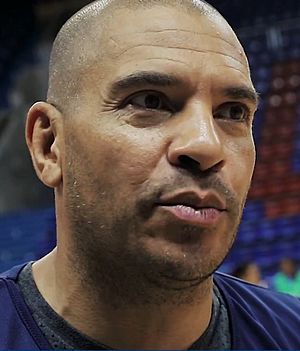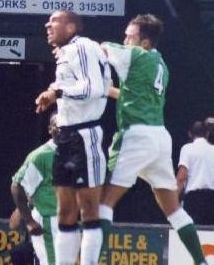Stan Collymore facts for kids

Collymore in 2018
|
|||
| Personal information | |||
|---|---|---|---|
| Full name | Stanley Victor Collymore | ||
| Date of birth | 22 January 1971 | ||
| Place of birth | Tittensor, Staffordshire, England | ||
| Position(s) | Striker | ||
| Youth career | |||
| 1987–1988 | Walsall | ||
| 1988–1989 | Wolverhampton Wanderers | ||
| Senior career* | |||
| Years | Team | Apps | (Gls) |
| 1989–1990 | Stafford Rangers | 35 | (11) |
| 1990–1992 | Crystal Palace | 20 | (1) |
| 1992–1993 | Southend United | 30 | (15) |
| 1993–1995 | Nottingham Forest | 65 | (41) |
| 1995–1997 | Liverpool | 64 | (28) |
| 1997–2000 | Aston Villa | 46 | (7) |
| 1999 | → Fulham (loan) | 6 | (0) |
| 2000 | Leicester City | 11 | (5) |
| 2000–2001 | Bradford City | 7 | (2) |
| 2001 | Real Oviedo | 3 | (0) |
| Total | 287 | (110) | |
| International career | |||
| 1995–1997 | England | 3 | (0) |
| *Club domestic league appearances and goals | |||
Stanley Victor Collymore (born 22 January 1971) is an English football expert and former player. He played as a striker from 1990 to 2001. He is best known for playing with Nottingham Forest and later Liverpool. He joined Liverpool in 1995 for a record transfer fee of £8.5 million. Today, he works as a senior football strategist at Southend United.
After leaving Wolves' youth team, Collymore played for Stafford Rangers. His talent was noticed by Crystal Palace, a First Division team, who signed him in 1991. He then moved to Southend United in the Second Division. His goals helped Southend avoid relegation.
In 1993, he joined Nottingham Forest for £2.25 million. He had two great seasons there, helping Forest get promoted to the Premier League. He scored 22 goals in the 1994–95 season, helping Forest finish third. In 1995, Liverpool signed him. He played well with Robbie Fowler at first. Later, he was replaced by Michael Owen and moved to Aston Villa in 1997.
After playing for Villa, he joined Leicester City in 2000. He had a brief return to form there. He then played for Bradford City and Real Oviedo in Spain. He ended his playing career in March 2001.
While he was a talented goalscorer, Collymore's career also had some challenges. He sometimes had disagreements on the pitch and with coaches. In 2021, he became involved with the management of his former club, Southend United.
Contents
- Playing Career
- International Career
- Life After Playing Football
- Return to Football with Southend United
- Personal Life
- Honours
- See also
Playing Career
Early Years
Collymore was born in Tittensor, Staffordshire. His father was from Barbados and his mother was English. He loved football from a young age and supported Aston Villa. He started playing as a centre forward for local junior teams.
He began his professional training with Walsall. Later, he joined Wolverhampton Wanderers. After leaving Wolves, he signed with Conference team Stafford Rangers.
Crystal Palace (1991–1992)
A scout from First Division team Crystal Palace saw Collymore playing for Stafford Rangers. He signed with Palace on 4 January 1991, when he was 19. He played his first game for Palace on 23 April against Liverpool.
Collymore stayed with Palace for almost two years. However, it was hard for him to get into the main team. This was because of the strong partnership of strikers Mark Bright and Ian Wright. He left the club in November 1992.
Southend United (1992–1993)
Collymore joined First Division team Southend United on 20 November 1992. Southend was struggling and close to being relegated. Collymore scored 15 goals in 30 league games that season. His goals helped Southend move out of the bottom three. They finished 18th, which was a great achievement.
Collymore later said that helping Southend stay in the First Division was one of his proudest moments.
Nottingham Forest (1993–1995)
Joining Forest and Promotion (1993–1994)
Collymore's strong performances at Southend caught the eye of many teams. These included his childhood club Aston Villa and newly relegated Nottingham Forest. Frank Clark signed him for Forest on 5 July 1993 for £2.25 million.
Collymore continued his great goalscoring form at Forest. He scored 19 goals in 28 games. He led the team's attack as Forest aimed for promotion back to the Premiership. On 30 April 1994, Collymore scored a late winning goal against Peterborough United. This 3–2 win secured Forest's second-place finish and automatic promotion.
Premier League Success (1994–1995)
He played his first Premiership game for Forest on 22 August 1994. He scored a goal in a 1–1 draw against Manchester United. Collymore scored 22 goals in the 1994–95 season. Forest finished third and earned a spot in the UEFA Cup.
Despite his success on the field, Collymore sometimes had disagreements with his teammates. Towards the end of the season, he received offers from Liverpool, Everton, and Newcastle.
Liverpool (1995–1997)
Record Transfer and Partnership (1995–1996)
Roy Evans signed Collymore for Liverpool on 3 July 1995. The transfer fee was £8.5 million, which was a new English record. Collymore first played alongside Ian Rush. Soon, Robbie Fowler replaced Rush as his strike partner.
The partnership of Collymore and Fowler was very successful. They scored 55 goals together in the 1995–96 season. This made Liverpool strong contenders for the Premiership title. On 3 April 1996, Collymore scored the winning goal in a thrilling 4–3 victory against Newcastle. This game is still remembered as one of the best Premier League matches.
Collymore also played in the 1996 FA Cup Final against Manchester United. Liverpool lost 1–0. This was the closest Collymore came to winning a major trophy in his career.
Challenges and Departure (1996–1997)
Expectations were high for Liverpool and the Collymore/Fowler partnership in the next season. Liverpool led the league for much of the first half. However, they finished 4th after some difficult games. Collymore continued to score goals.
Towards the end of the season, he played less often. The rising young striker Michael Owen began to take his place. Rumours started that Collymore would leave Anfield.
Aston Villa (1997–2000)
Joining His Boyhood Club (1997–1998)
Collymore joined his childhood club Aston Villa on 16 May 1997 for £7 million. He made his debut for Villa on 9 August 1997. He scored his first goal for the club on 27 August.
His first season at Villa was challenging. He scored six goals and faced some injury problems. He also struggled to get into the starting team ahead of Dwight Yorke.
Personal Challenges (1998–1999)
In the 1998–99 season, Collymore scored only once in 19 games. He faced personal challenges during this time. He sought support and took a break from football. He returned to the Villa team later in the season. However, after a game against Chelsea on 21 March 1999, manager John Gregory did not select him for the rest of the season. This was his last game for Aston Villa.
Fulham (1999)

After leaving Aston Villa, Collymore went on a three-month loan to Fulham at the start of the 1999–2000 season. He scored the winning goal in a League Cup game against West Bromwich Albion on 12 October 1999. Fulham did not sign him permanently after the loan.
Leicester City (2000)
New Start and Injury (1999–2000)
Collymore left Aston Villa and joined Leicester City for free on 11 February 2000. Soon after joining, he was involved in an incident during a team trip to Spain. He was fined £30,000 and given community work by manager Martin O'Neill.
In his second game for Leicester, he scored three goals against Sunderland. He scored four goals in six games for Leicester that season. He was injured during a game against Derby County on 2 April, breaking his left leg. This meant he missed the rest of the season.
Challenges and Departure (2000–2001)
Collymore recovered from his injury and stayed with Leicester. However, with a new manager, Peter Taylor, he played less often. He scored one more goal for Leicester against Chelsea.
He was involved in an on-field incident during a game against Everton. He later requested to leave the club. Manager Peter Taylor placed him on the transfer list due to concerns about his fitness and attitude. Collymore left Leicester in October 2000.
Bradford City (2000–2001)
Bradford City signed Collymore on 26 October 2000. He made his debut against Leeds United on 29 October. He scored a memorable overhead kick in a 1–1 draw. However, his celebration caused some controversy.
He faced a three-match ban for an earlier incident while at Leicester. After returning from his ban, Collymore was placed on the transfer list by the club chairman. He decided to sign with Spanish team Real Oviedo.
Real Oviedo (2001)
Collymore signed an 18-month contract with Primera Liga team Real Oviedo on 31 January 2001. He made his debut on 4 February 2001. He played only three games for Oviedo.
On 7 March 2001, at the age of 30, he announced his retirement from professional football. He said he wanted to explore other career opportunities. He was offered chances to return to football, but he did not play again.
International Career
After a strong season in the Premier League, Collymore was called up to the England squad in June 1995. He made his debut at Wembley Stadium against Japan. He played alongside Alan Shearer in a 2–1 win. He also played briefly against Brazil.
Collymore made his third and final appearance for England in a 4–0 win over Moldova in 1997.
Life After Playing Football
Collymore helped write his biography titled Stan: Tackling my demons. In 2005, he acted in the film Basic Instinct 2.
In 2008, Collymore won over £1.5 million in damages from his financial advisers. A judge ruled that he had received poor investment advice after retiring from football.
Collymore worked as a football expert and presenter for Talksport radio for eight years. He also worked as a commentator for BT Sport. He writes a column for caughtoffside.com.
Return to Football with Southend United
In April 2021, Collymore contacted Southend United chairman Ron Martin. He offered to buy the club. He also discussed the possibility of an associate becoming the club's CEO.
In October 2021, Collymore helped choose a new club manager. He offered more support to the club. On 4 November 2021, he was announced as the club's senior football strategist.
Personal Life
Collymore has spoken openly about his well-being. He sought support in 1999 while playing for Aston Villa. Since retiring, he has continued to raise awareness about mental health.
He supports Republic, a group that wants an elected UK head of state. He supported the Labour Party before joining the Scottish National Party in December 2015.
Incidents During His Career
In February 2000, while playing for Leicester City, Collymore was involved in an incident during a team trip. He was fined £30,000 and ordered to do community work. Later, in December 2000, while playing for Bradford City, he was injured in a nightclub.
Honours
Individual
- PFA Team of the Year: 1993–94 First Division
- Premier League Player of the Month: January 1996
See also
 In Spanish: Stan Collymore para niños
In Spanish: Stan Collymore para niños
 | Tommie Smith |
 | Simone Manuel |
 | Shani Davis |
 | Simone Biles |
 | Alice Coachman |

